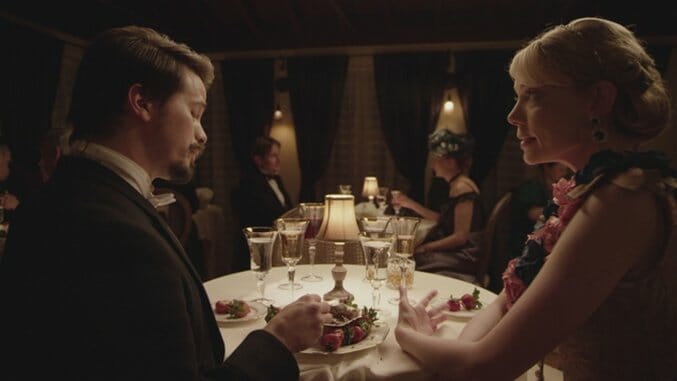Introducing Endless Mode: A New Games & Anime Site from Paste
If ever a sentiment existed that comedy can’t (or shouldn’t) tackle certain topics, then it seems to be Another Period’s job not just to challenge that thought but to explode it completely. Leave it to the irreverent show to turn the oft examined question of whether ex-lovers can be friends on its head by using Beatrice (Riki Lindhome) and her brother Frederick (Jason Ritter) to answer it.
From its very first episode, Another Period has focused on the love affair between these two siblings. Both grew up in a home so devoid of healthy emotional support that they turned to one another to find it, but their familial bonds quickly turned sexual in the “anything goes” atmosphere of the early 20th century’s very wealthy. It helps, too, that Beatrice and Frederick just so happen to be the Bellacourt family’s most dim witted members. They simply don’t understand the taboo nature of their relationship. Loving your brother or sister as you would a lover is simply a natural extension of the attachment siblings can develop.
From the start, Beatrice and Frederick’s relationship has been an uneasy one to watch. Literally. Another Period doesn’t content itself on telling us about their incestuous affair—it shows it, at least within the limits of a basic cable show. It’s not only a matter that Beatrice and Frederick are involved in perhaps the most prohibited relationship possible, but that the show also go there, taking viewers inside their bedroom to see the kinky foreplay they enjoy and more.
Their love faced a major hurdle towards the first season’s end when their father Commodore (David Koechner) returned home to marry off Frederick to Celery Savoy (Missi Pyle). Even though their love affair persisted throughout Beatrice’s marriage, once Frederick was engaged things stopped between brother and sister. The show has been slow to reunite the pair in the second season, but in “Servants’ Disease,” they finally get the chance to explore their connection solely as platonic friends and siblings.
Well, maybe.
Although Beatrice and Frederick have seen one another since he moved to Washington to become first a senator and later the Vice President of the United States, they haven’t had the chance to reconnect fully. That changes when Beatrice travels two weeks by carriage and breaks into Frederick and Celery’s home to announce that she’s met someone. She’d like to go on a double date with her brother and his wife, a dinner that ends up leaving the siblings alone at the table.
The chemistry between the two is persistently, uncomfortably, there thanks to stellar comedic acting by Lindhome and Ritter, who have played lovers before in Garfunkel and Oates. Left alone at the table, Beatrice and Frederick feed each other chocolate-dipped strawberries and congratulate themselves on no longer feeling feelings. They can be friends. Friends who lick chocolate off one another’s faces, kiss, and eventually take a bubble bath together. “We’re the same people we were back then. We’re bathing as friends, bubble buddies,” Beatrice tells Frederick as they enjoy their tub time together. But that raises the question of whether they can be “coitus colleagues,” the early 20th century precursor to “friends with benefits.” Watching a brother and sister have sex in a bathtub (one of the many intimate scenes the show has staged between the pair) is awkward, to say the least. But that’s exactly how Another Period likes positioning viewers. It’s as if the show were perpetually pushing the taboo/comedy envelope to see what it can get away with, and to prove that nothing is off limits. After all, the show has covered rape, racism, drug addiction and more, each in an irreverent fashion so as to challenge those who continue arguing these topics should be spared from comedy’s lens.
While other comedians tend to discuss such topics to make a larger point, Another Period contents itself with skewering the notion of prohibited subject matter for the sake of skewering the notion of prohibited subject matter. Laughter, it likes to remind viewers, is a release and a relief.
Amanda Wicks is a freelance journalist specializing in comedy and music. Follow her on Twitter @aawicks.
